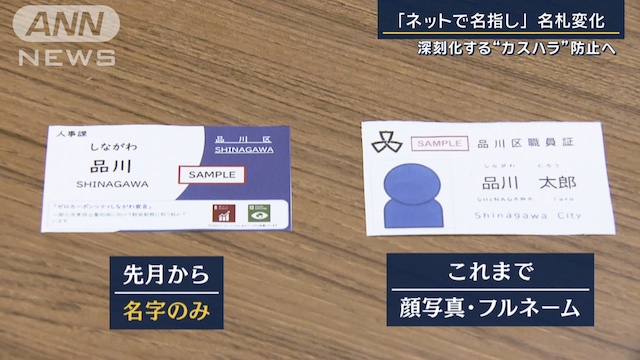TOKYO, May 14 (News On Japan) - Last month, Shinagawa Ward Office introduced new name badges for all staff, now displaying only last names instead of full names and photographs. This change comes in response to serious concerns.

Name Badge Change Due to 'Online Targeting'
"The stress of having to work in fear is unbearable," was the catalyst expressed by the field staff.
Masuda from Shinagawa Ward's Registry and Residents Division commented, "I've seen colleagues having to deal with assertive residents. It's scary when someone's name is posted on the internet. Creating an environment where both staff and customers can interact safely is ideal."
This initiative is spreading across national municipalities.
Shinagawa Ward Mayor, Kyoko Morisawa, noted, "We've received feedback that it's now easier to work safely. (Regarding harassment lines) Customer harassment is tricky. Especially deciding where to draw the line with municipal harassment is challenging. Having actual rules might make it a bit easier to manage."
Legal Expense Insurance for Small and Medium-sized Enterprises
Customer harassment or "Cus-hara" involves unreasonable demands or behaviors by customers. According to a survey conducted this year by UA Zensen, a labor union for service industries, over 40% reported no measures against customer harassment.
In response to growing consultations from companies, insurance for legal expenses targeting small and medium-sized enterprises is being offered by insurance companies. This 'Cus-hara Insurance' allows direct consultations with lawyers and covers legal fees. The number of SMEs subscribing has more than doubled over two years.
Miho Ishii from Sompo Japan, a product manager, said, "Service industries, dining, and construction sectors often face direct interactions with customers. Many SMEs lack manuals for handling customer harassment or consulting lawyers. This insurance will become increasingly necessary."
Inter-Company Lawsuit Over Customer Harassment
Last month, an incident involved an employee from a home appliances sales company who was harassed by a client company's president, leading to a lawsuit between the companies. According to the complaint, during a visit to the client in March last year, the employee was yelled at for about two hours, being asked, "Who do you think you are?" The demeaned employee was driven to take a leave of absence and is now seeking 11 million yen in damages from the client.
Clarifying Definitions: Consideration for Legal Framework
Customer harassment is becoming a societal issue, prompting political action. The Liberal Democratic Party's project team on customer harassment gathered on the 13th to compile suggestions, including clarifying what constitutes customer harassment, which is difficult to distinguish from legitimate complaints.
Takahiro Tabata, head of the LDP's "Cus-hara" Measures Project Team, stated, "Concerns about customer harassment have been rising from various perspectives in recent years. First and foremost, we want to make recommendations from the perspective of protecting a healthy work environment for workers."
The recommendations include obligating companies to establish consultation systems to protect employees, training for employees on customer interactions, and strengthening cooperation with the police.
The government plans to incorporate these measures into the "Fundamental Policies" to be finalized next month, and they intend to submit these proposals to Prime Minister Kishida within this week.
Source: ANN














